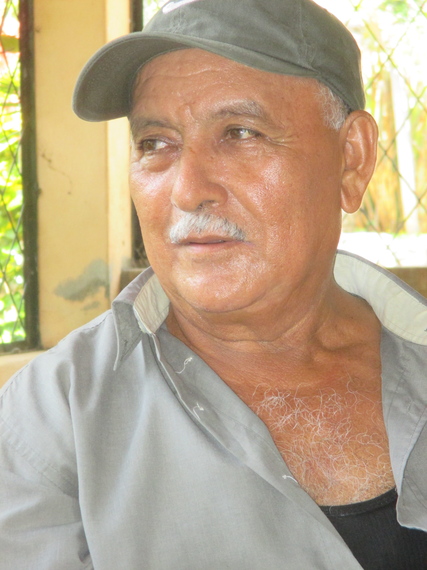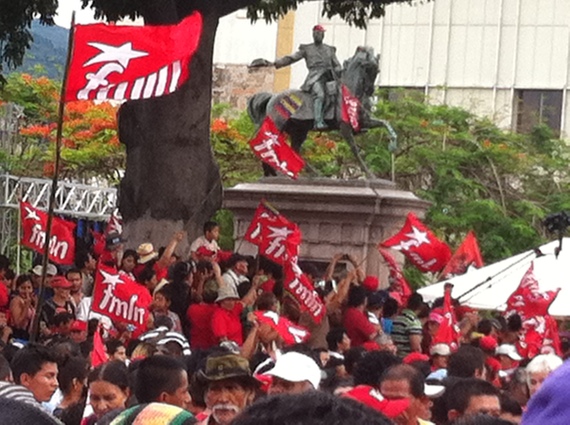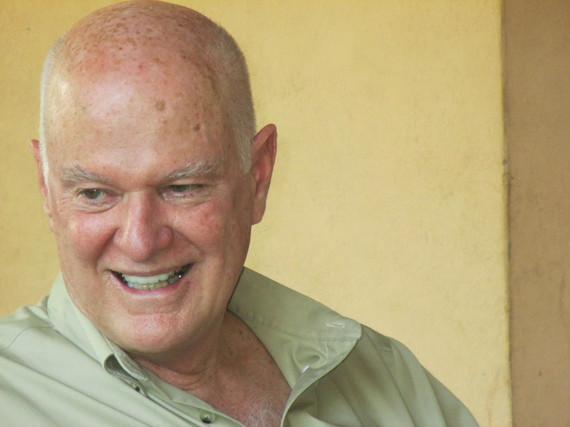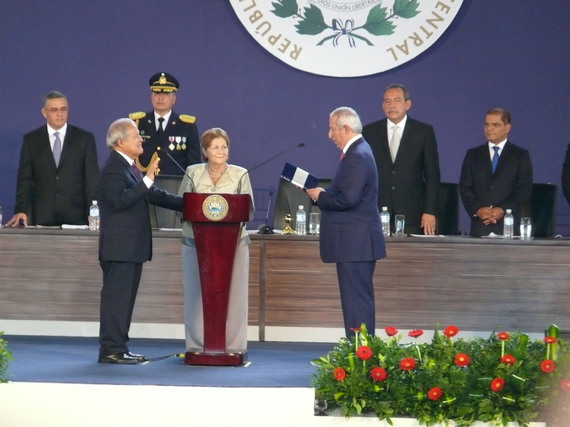The Honduran soldier at the checkpoint had a large rifle slung over his shoulder. He looked to be no more than 16-years-old. Boys and young men with guns always scare me, even more so when I don't know the language. My able driver, an American in his early 20s, deftly got us through and into the refugee camp. It was May of 1982.
We were in Mesa Grande. More than 10,000 Salvadorans who had fled the violence of the civil war were living there. I had brought two huge suitcases filled with medical supplies. Some medicines were for the refugees, but the lion's share was meant for the civilians living in regions served by the guerrillas of the Farabundo Marti National Liberation Front (FMLN), the group leading the military struggle against the right-wing oligarchy that controlled El Salvador.
I had brought antibiotics, pain-killers, tranquilizers and anesthetics, as requested. The medicines were given to young men who slipped into Mesa Grande at night and then vanished back into the darkness to make the long and dangerous trip to their respective controlled areas in El Salvador. I was hoping that some of the medicines would reach a young American doctor, Charlie Clements, who had hiked into El Salvador to serve civilians in the guerrilla-controlled zone around the Guazapa Volcano.
The following morning I was awakened at 5 a.m. by the sound of what sounded like clapping. It was the hard working Salvadoran women making the day's tortillas. Everyone seemed to be up early and busy.
I spent the day seeing patients with an American doctor who was doing her best to care for the Mesa Grande community with limited resources. I wasn't used to practicing medicine without benefit of a laboratory or x-rays, but many of the problems were easy to diagnose. We treated patients with pneumonia, dysentery, arthritis, and headaches. The following day I made my way back to Tegucigalpa and from there to my home in Oakland.
I was part of The Committee for Health Rights in El Salvador, a group I had started along with other health activists from the San Francisco Bay area. Most of us had come of age during the war in Vietnam. That war had changed the way I saw the world. I had grown up thinking that we were the good guys. President Kennedy and his pretty wife Jackie had transformed the White House into a modern day Camelot, while Khrushchev appeared crude in his ill fitting suit, banging his shoe on the table at the United Nations.
But Vietnam had changed all of that. We were told that we were destroying villages in order to save them. Our soldiers massacred unarmed men, women and children at My Lai. News of the Phoenix Program with its grisly death toll had reached us. President Nixon expanded the war into Laos and Cambodia and then had the audacity to lie to the American people about it. I had spent a good deal of time during my college years protesting that war.
The situation unfolding in Central America looked frighteningly similar. I was determined to do what I could to prevent another Vietnam tragedy. The Committee for Health Rights in El Salvador was formed to see if those of us who were health professionals could make a real difference. We wrote and spoke about the Salvadoran situation from the health perspective and we raised money for medicines to help heal the wounds caused by weapons that had been purchased with our own tax dollars.
One day a young lawyer from Salinas came to visit me in my Oakland home. He asked me to support his friend Charlie Clements. The lawyer was Bill Monning, now a California State Senator. Bill was Charlie's lifeline while Charlie, or Camilo, as he was called in Guazapa, was delivering health care to the thousands of civilians who lived in the region. I gladly agreed to help in any way I could.
A year later, Charlie was my houseguest. He had just left El Salvador. A decision had been made that he could be of more help to the Salvadorans by coming home, raising much needed funds for medical supplies, and lobbying for an end to U.S. military aid to a country that was killing a thousand of its own each month.
Most of those killed were civilians. Some were in unions. Others were in agricultural cooperatives. The right wing oligarchy viewed them as subversives as their organizing for higher wages and a dignified standard of living threatened to upset the status quo. Others were murdered because of their ties to the church after brave priests and nuns began empowering the poor by preaching liberation theology. Health workers treating the poor were also targeted for assassination by death squads.
To put this death toll in perspective, multiply by 50. At the time of the conflict the U.S. population was fifty times that of El Salvador. Each month El Salvador was losing proportionally as many of its people as the U.S. had lost in the entire Vietnam War. At the height of this conflict the U.S. was sending $1 million every day in military aid to fund this carnage.
Charlie would become one of the most effective critics of U.S. Central American policy. Today he is the Executive Director of the Carr Center for Human Rights at the John F. Kennedy School of Government at Harvard University.
By the end of the 1980s, the focus of my political activism had shifted from El Salvador to other pressing concerns. Charlie and I kept in touch. This May, he sent me an e-mail, inviting me and my beloved partner, Vivien Feyer, to accompany him to the Salvadoran Presidential Inauguration, and to visit Guazapa with him. Two former FMLN military commanders, Salvador Sanchez Ceren and Oscar Ortiz, had narrowly defeated the right wing ARENA Party and would become El Salvador's new President and Vice President. It was a once in a lifetime opportunity, as Charlie had put it, and so off we went.
Our transport would take us to the small village of Palo Grande on the upper slopes of the Guazapa volcano, but first we stopped for lunch outside of Suchitoto. Our group consisted of Charlie, Vivien, our Salvadoran hosts, former Berkeley Mayor Gus Newport, his wife Kathryn Kasch, and me.
Kathryn Kasch, Dimas, Charlie Clements, Francisco Acosta and Gus Newport, Guazapa region, El Salvador, May 2014, photo courtesy of Vivien Feyer
Gus, like Charlie, is a hero to the Salvadorans. He had visited the guerrilla-controlled zone of Chalatenango during the height of the war, risking his life. He had committed his city, Berkeley, to a sister city relationship with the small town of San Antonio Los Ranchos. Berkeley was the first city to make such a gesture of solidarity and the first city with a church declaring sanctuary to protect a Salvadoran family from deportation. Now 79-years-old, and due for a knee replacement, Gus nevertheless made the trip to El Salvador.

former FMLN military commander Dimas, Guazpa region, El Salvador, May 2014, photo courtesy of Vivien Feyer
Dimas, a former FMLN military commander joined us for lunch. He is a handsome man, probably in his mid-sixties, with a well- trimmed white moustache. He was wearing a green baseball cap with a Nike logo on it. In Witness To War, Charlie's account of his year in Guazapa, he described Dimas as:
among the bravest and most popular of the guerrilla comandantes...a true
swashbuckler. He even looked the part of the romantic rebel, down to the cowboy hat, black boots, and snow-white horse he rode throughout the Front.
During his year in Guazapa, Charlie and Dimas would share a particularly difficult experience, one neither of them would ever forget. Not yet recovered from a severe case of malaria, which had almost killed him, Charlie was summoned to attempt to save the life of Julia, Dimas' wife, and her unborn child. Julia was severely anemic and suffering a difficult labor complicated by placenta previa, an obstetrical emergency. She had been bleeding for a full day. She was desperately in need of blood, and there was none available. Charlie had an assistant draw two units of his own blood, which he knew to be safe to transfuse, and to give them to Julia. Then he operated hoping he would have the strength to stand during the surgery.
The baby was out in four minutes, but had no signs of life and could not be revived. Moments later, Julia went into cardiac arrest and could not be resuscitated.
An hour after the double tragedy, Charlie, on his way to yet another medical emergency, ran into Dimas on the trail. Charlie recounts this heart-wrenching meeting in Witness To War:
As steadily as I could, I told the comandante that he was a widower, that Julia and their infant daughter had died under my knife. Humbly, I said I was very, very sorry..."You must not let this tragedy defeat you," was all he (Dimas) said, but even then I could see tears welling in his eyes...I stood on the trail for a few minutes, marveling at his stoicism. The man's wife and infant daughter had just died on the operating table, and he was consoling their doctor!
Now, 32 years later, Dimas told us that he had since remarried and that his new wife had given birth to a healthy child. Charlie asked Dimas, who had read Witness To War in Spanish, if the book was an accurate portrayal. Dimas responded that 70 percent was on target, but that 30% was "flowers", meaning a bit sugar coated. I was surprised. The book chronicles a year of severe deprivation, chronic hardship, tragedy and brutality and yet Dimas felt that the reality was even worse than Charlie had portrayed it.
After lunch, while climbing the slope of the volcano so we could see Lake Suchitlan in the distance, Charlie explained the brutal realities of the war. As we climbed, a campesino returning from his fields with machete in hand, encountered our group. He had been a combatant and remembered well the great contributions of Camilo. It seemed that everywhere we went in the Guazapa region, folks would have stories to tell of Charlie's selfless deeds in doing all he could with few resources to improve the lot of these long suffering people. Clearly, he had a place of honor and respect in their hearts.
I had read some of these stories in Witness to War, but meeting the people and seeing the love they had for Charlie up close and in person took my breath away. Charlie's courage is matched by his intelligence, humility and selflessness. I have personally worked with only a handful of people who have inspired me as much.
The following day we traveled to Chalatenango, and met with the mayors and community activists of several towns. Now it was Gus Newport's turn to be celebrated. Gus had come to Chalatenango when it was a free fire zone and he was evacuated into a makeshift bomb shelter when U.S. made planes dropped U.S. made bombs on the Salvadoran civilians living there.
Gus Newport warmly greeted by the mayor of San Jose Las Flores, Chalatenango, El Salvador, May 2014, photo courtesy of Vivien Feyer
Gus is a large man and the Salvadorans tend to be small. He was actually too big to fit into their small underground bomb shelters. He needed to be evacuated to the underground hole used for dumping garbage. We all laughed as the mayor of San Jose Las Flores recounted these events. Gus had toured Chalatenango on horseback at the time, and the poor mare he was riding died after carrying Gus up the steep mountain trails. Again we laughed, and also we cried as Gus told us, with tears in his eyes, his voice quivering with emotion, that he had feared he would never see these brave Salvadorans alive again.
Our delegation was organized by the Salvadoran Humanitarian Aid, Research, and Education Foundation (SHARE). Since its inception in 1981, SHARE has been working to promote economic sustainability, justice, and human rights in El Salvador.
Jose Artiga, SHARE's Executive Director, explained SHARE's concept of "accompaniment":
As an organization of international solidarity, SHARE recognizes that it is not our role to enter into communities, identify problems, and define and finance solutions. Instead, it is the people and communities living the cycles of injustice and oppression that need to lead the long-term efforts for structural change. Our role is to support the empowerment of and walk in solidarity with these communities, organizations and individuals. This is called mutual accompaniment.
Jose was miraculously able to get each of us on the delegation an invitation to the Presidential Inauguration. As we sat and listened to the new President's inspiring speech, I began to wonder how people like me could make meaningful contributions now to help usher in a new era of peace with justice in El Salvador.
Salvador Sanchez Ceren being sworn in as El Salvador's new president, June 1, 2014, San Salvador, photo courtesy of Vivien Feyer
Could we somehow take part, not in "fixing" the existing problems, but in accompanying the Salvadoran people on their journey toward a peaceful and just society?
Perhaps we could help the campaign of the Mothers and Relatives of the Disappeared to get August 30 officially designated as the day of remembrance for the tragic losses they had suffered. Perhaps we could help those struggling to prevent the environmental devastation that accompanies metal mining. Perhaps we could help organize and participate in future delegations to El Salvador so that our neighbors and friends in the U.S. could be kept well informed about the situation. Perhaps we could help change U.S. policy so that our aid would not be contingent on the Salvadorans needing to buy agricultural seeds from Monsanto, but rather to use their own indigenous seeds that nature had adapted to the Salvadoran climate and soil. Perhaps our role should be to petition the U.S. for reparations to be paid to those who suffered losses due to our military aid. Perhaps we could aid in the plans the Salvadorans have to create a women's leadership training institute to combat a culture of machismo and encourage women to run for office and to lead NGOs.
For more information and to find out how you can get involved, contact SHARE at www.share-elsalvador.org.




